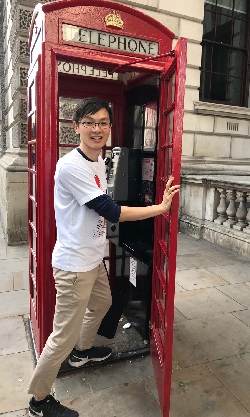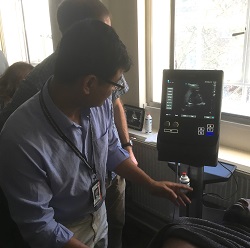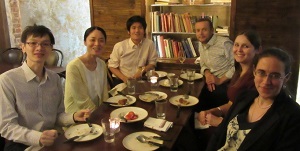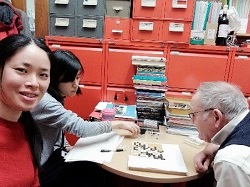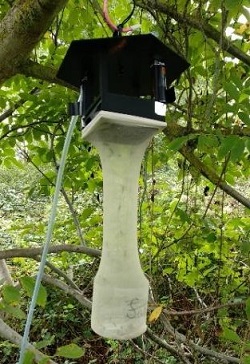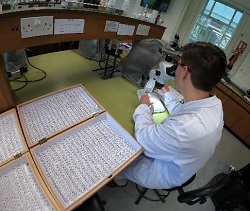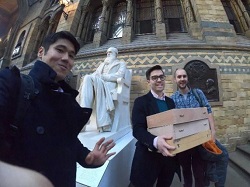昨年度、ロンドン大学衛生・熱帯医学大学院(LSHTM)の尽力により、英国政府予算による Rutherford フェローシップグラント(Rutherford Fund Strategic Partner Grants 2018)が獲得され、本学から5名の若手研究者がロンドン大学衛生・熱帯医学大学院(LSHTM)へ派遣されました。6 か月間の成果がエッセイにまとめられています。
(※本文は英文のみの掲載となります)
Chris Fook Sheng Ng
Experience as a Rutherford Fellow at the London School of Hygiene and Tropical Medicine
With the support of a fellowship from the Rutherford Fund, I visited the London School of Hygiene and Tropical Medicine for 6 months in 2018. During the visit, I had the opportunities to network and explore collaborations with researchers in the School, in particular with a group led by Dr. Antonio Gasparrini renowned for their contributions of advanced statistical methods for research in the area of planetary health and climate change. The various interactions during the fellowship had broadened my access to resources outside my current scope and helped to identify international research collaborators working on similar topics. A notable accomplishment is the development of a protocol connecting researchers from a number of countries to disentangle the complex health risks of transboundary dust pollution across the globe.
As a Student and Teacher
The fellowship has also afforded me the opportunity to experience a world-class education at a top public health university. Through participation in a series of courses and workshops I was able to bring myself up-to-date with the recent statistical techniques for causal inferences and methodological developments in epidemiology. The experience has exposed me to new pedagogical approaches that can improve statistical teachings at Nagasaki University.
Future Plan
Going forward, the plan is to continue collaborating with researchers at the school to develop a stronger partnership, which will be valuable to identify further opportunities for research exchanges and capacity building, especially in the area of environmental health currently understudied in many tropical regions. There is definitely more work to be done, and my team welcome prospective students and researchers interested in working together on issues related to our environments and health!
Bhim Gopal Dhoubhadel
Thank you, Rutherford!
I was very lucky to be one of the Rutherford fellows to go to London from Nagasaki in 2018. Besides doing DTM&H course in LSHTM, I had opportunities to attend and participate scientific conferences and workshops in London that helped me to develop my research idea and learn scientific methodologies to carry out the research.
During DTM&H course, I met students from 35 countries from all over the world. They have various backgrounds and career goals. The course was very intensive, and full of laboratory practical; however, social events in the evenings were great to know the city as well as other students. I enjoyed lot living and studying in London.
Remaining time, I spent for developing a research proposal for pneumococcal carriage survey in Nepal. I learned the use of Open Data Kit in my research, and had opportunities to have meetings with prospective collaborators for the project. During the stay, I could finalize the research plan and apply for the ethical clearance in Nepal.
I am very much grateful to Prof Koya Ariyoshi, Prof John Edmunds, Dr Shunmay Yeung, and Dr Chris Smith who took care of me during the fellowship. I am thankful to Dr Alexandra Anderson for great admin support.
Bhim Gopal Dhoubhadel
School of Tropical Medicine and Global Health (TMGH)
Nagasaki, Japan
Photo: Learning point-of-care ultrasound during DTM&H course
Michiko Toizumi(樋泉 道子)
My Study and Life in London
I stayed in London twice to study and work as a Rutherford fellow in 2018-2019. I was working with Dr. Stefan Flasche, LSHTM, for infant contact pattern in nursery relevant to the spread of Streptococcus pneumoniae, Nha Trang, Vietnam. I made a study plan and applied it for the ethics committee in LSHTM, in the summer (the first stay), conducted the field survey in Vietnam in the autumn, summarized and analyzed the results in LSHTM in the winter (the second stay).
It was a small study but I could experience a whole process of conducting a study in LSHTM. Researchers, how they communicate, how they work, and even the administrative system there were new for me. Stefan’s area, mathematical modeling, itself was new and difficult for me but I could learn what people in the area are working for and how they collaborate with those outside of their field. We could publish a paper of the small study and now working together on a larger survey to know infant contact pattern in Vietnam. Contact pattern is recently focused in the modeling field to predict pathogen transmission and effect of vaccination. I believe that we can continue our collaboration to investigate childhood infectious diseases and vaccination.
During my stay in LSHTM, I joined a summer short course, “Epidemiological evaluation of vaccines: efficacy, safety and policy” and learnt epidemiology of a vaccine. It was a very intensive course with classmates from all over the world. In winter, I participated in some classes of Statistical Methods in Epidemiology and was surprised that they were organized very well and the students were enthusiastic. At LSHTM, there were many special lectures open for everyone. It was a very good environment to study and to be stimulated.
Also, I enjoyed my life in London a lot. Summer was bright; gardens, 2018 FIFA World Cup, and pubs. Winter was dark; ice-skating, museums, and Go games.
Mizuki Takegata(竹形 みずき)
Name: Mizuki Takegata RNM, PhD, Rutherford research fellow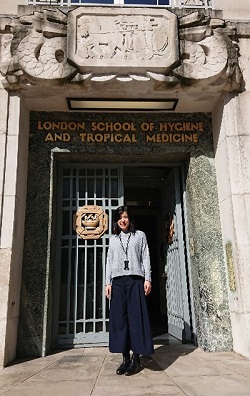
Affiliation: Department of Pediatric Infectious Diseases, Institute of Tropical Medicine, Nagasaki University, Japan.
Period of studying at LSHTM: November 2018 to March 2019
It was a great honor to have the opportunity of learning at the London School of Hygiene and Tropical Medicine (LSHTM) as a Rutherford research fellow. I studied at LSHTM from November 2018 until March 2019. It was amazing to see the beautiful autumn-colored leaves in Russel Square during my first week there.
I have been working on the Pneumococcal conjugate vaccine project for children in Nha Trang city in Vietnam since 2016. Since my background is in midwifery, at the same time, I started to look into existing health problems relating to pregnancy and childbirth in urban areas of Vietnam. I came to realize that the rate of Caesarean section (CS) was high (>40%), which possibly correlated with rapid urbanization, leading to an increase in subsequent risks for both mother and child. I therefore decided to report the real situation in order to allow the Vietnamese people to recognize this issue. However, I realized that the issue of increased CS is more complicated and is caused by multiple factors which are not only medical but also political, psychological, cultural and social.
I sincerely thank Dr. Carine Ronsmans for her wonderful supervision. During my time at LSHTM, Dr. Ronsmans helped me deepen my understanding of this issue in the context of global health and to capture this issue in a more multi-disciplinary way. She suggested that I join the master module class ‘Current issues of maternal and child health.’ This was a valuable experience, which gave me the chance to discuss the multi-faceted strategies regarding the high CS rate issue in Brazil. I was amazed by the enthusiastic atmosphere of the master course students at LSHTM. Attending the master course and communicating with the students was an exciting experience, where powerful discussions often created new ideas.
Although my stay was short, I enjoyed British culture such as the gardens, theaters, and museums. During the Christmas season, London was particularly beautiful. When I had free time, I liked to walk around a park close to my accommodation and drink tea in a nearby café. Because London is an international city where there are many people of different origin, I also learned about different cultures within the city. Living in a cosmopolitan city gives people more opportunities to know about different cultures and to develop sophisticated communication skills, which would enhance integrated research activity.
Finally, I would like to thank all my teachers and friends who supported me at LSHTM.
Tomonori Hoshi(星 友矩)
Thanks to Rutherford Fund Strategic Partner Grants, I had a delightful opportunity to collaborate with researchers and staff in London School of Hygiene and Tropical Medicine. My research project aimed to test our novel mosquito trap, which is created using a 3D printing technology, in the UK under the supervision of Professor James G. Logan (Head of the Department of Disease Control and Director of ARCTEC).
My first day of the fellowship started in 17th July 2019 with a strong passion for UK mosquitoes and hope to complete the project in six months. After visiting many parks in London and surrounding areas to find a suitable place to conduct research, RSPB Rainham Marshes, Essex kindly provided permission to collect mosquitoes. Mosquito samplings started on 4th September with great weather. The samplings continued until 26th September and nearly 1,500 mosquitoes were collected.
We were in haste since the project was scheduled to present at the end of October in the American Society of Tropical Medicine and Hygiene, 67th Annual Meeting. To finish everything by the meeting, Dr. Victor A. Brugman, Honorary Assistant Professor and I worked hard to complete all mosquito identification. Everything has been done at the last moment, and some of Professor Logan’s staff including a co-author of this study, Dr. Thomas Ant and I went to the meeting. This whole experience encouraged me to work harder on mosquito researches.
Time passed quickly. – At the end of my fellowship in the middle January, we donated all pinned mosquito specimens to Natural History Museum in London. The samples were stored in a traditional manner, which I believe the best to respect nature as natural scientists have historically done. These samples might contribute science in an unexpected way in future, and they cannot be existed without Rutherford fellowship giving me the opportunity to work with researchers in London School of Hygiene and Tropical Medicine. The results of the project including 3D-printed trap design is available at www.nature.com/articles/s41598-019-47511-y.

